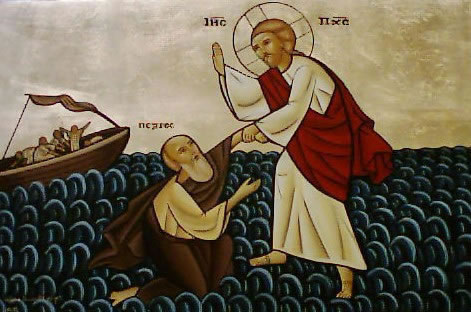I have written in the past about the Institute of Catholic Culture instituteofcatholicculture.org/ and the great work it is doing. It is worth mentioning the ICC again, if only to bring to your attention once more the value of what they do and the success of their model of engagement, which I think could be used by other organizations. First, it connects with people at the local level and creates a community of faith and learning. Then it organizes talks and workshops for that community, which are also broadcast live over the internet, and recorded and uploaded onto their website. This makes available a large and ever-growing resource of material about all aspects of the Faith, for free.I described this in more detail here in a past blog post.
Since I wrote this first article, Deacon Sabatino, the Institute's director has morphed, or perhaps I should say 'transfigured' into Fr Hezekias - Congratulations on your ordination Father! Also, as the new look website describes, the free material has been organized into a series of structured programs available for your self-education. When I was talking to Fr Hezekias about this, he told me that his materials are of such a high standard that they are used by the formation programs of several communities of cloistered religious!

For example, you might want to look up the content of my last talk given there, at the beginning of the summer, in which I give an introduction to the transcendentals - objective beauty, truth, goodness, unity...and two lesser know transcendentals referred to by St Thomas, res and aliquid. (The thing and the other thing, by which he is saying, as I understand it, that all created things are made to be in relation to something else). Go the website, here, to the Library, and then on the right hand side you will see 'Talk Lists' and 'By Speaker'. If you go to that list you will see my name and the talk title 'Lift Up Your Eyes - Understanding the Transcendentals'.
I have been invited to give another talk about prayer entitled Living Christ: Reclaiming the Church in Our Home and Life. It will be on Sunday, September 11th, at the St Ambrose Church Hall, located at 3901 Woodburn Road, in Annandale, Virginia. It will be held in the evening from 6:30 to 8:45.
In this talk, I will speak about the principles of prayer and personal reflection that are described in the book, the Little Oratory, A Beginner's Guide to Praying in the Home.
I will explain all that is in the book through my own story in prayer that contributed through my own experiences and the guidance that I have been given over the years to the creation of the book. This is a story of the power of prayer to change someone. It began over 25 years ago when someone threw down a 'Pascal's Wager' challenge to me: 'Try this for 30 days and see how you feel; if you don't like it, we'll return your misery with interest. What else have you got to lose?' From a very simple daily routine in prayer that I was given, a faith in God developed very quickly, and a new world opened up to me.
I should point out of course, that the Little Oratory was co-written with Leila Lawler. What made this cooperation so effective was that we were both converts who had come to very similar conclusions about praying in the home through quite different experiences. Leila's 'story in prayer' - the spiritual journey by which she reached that point - is different to mine as one would expect. But I always felt that it was that dual perspective of the same truths that helped to make the book as rich as it is. Of course if you want Leila's story in prayer, you'll have to invite her to talk about it. She's a great speaker I can assure you!
It was because the pattern of personal prayer that I was given right from the beginning of my journey was modelled on that of the liturgy, albeit subtly, that when much later I walked into a church with beautiful liturgy I was so receptive to what I saw, My daily prayers had formed me to be so. I had no idea about that at the time, of course; and if I had known, I would probably have refused to do any of it given my prejudices at the time. When this offer was made to me I was a miserable, bitter anti-religion atheist. I will describe how a man called David managed to attract my attention in the first place, so that, suspicious and sceptical as I was, I was prepared to pray and how very quickly because of the effect it had, I became convinced of the power of prayer. Furthermore, I was shown how by the same man how to discern my personal vocation. He inspired me to believe that God want me to be joyful and free and this lead to my changing direction altogether in my career and doing what I do now. I will talk about this too.
I am bringing my personal experiences into this for a couple of reasons - one is that it always helps to illustrate the general through the particular if we want people to remember and understand. Second is in reaction to response to an article I wrote recently that compared the ideas about culture of Roger Scruton and Pope Benedict XVI. It was called Two Conservatives Seeing Eye to Eye on Culture. In this I mentioned Benedict's suggestion of offering Pascal's Wager to people. Some people responded by saying that they doubted it was possible to engage people to take the wager. I want to show that I think that it is possible by describing how I was engaged and evangelized. This is a method that I have used in turn with others to some effect.



